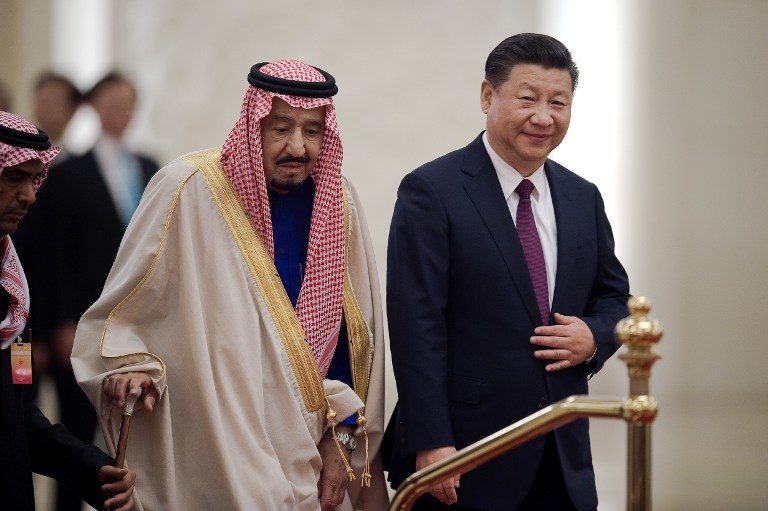SUMMARY
This is AI generated summarization, which may have errors. For context, always refer to the full article.

BEIJING, China – Chinese President Xi Jinping welcomed visiting Saudi King Salman to Beijing on Thursday, March 16, as China pursues a charm offensive towards the Middle East, where it has previously kept a low profile.
The king’s 3-day stay returns the favor after Xi last year visited Saudi Arabia as part of the first state visit to the Middle East by a Chinese leader in 7 years.
The 81-year-old monarch arrived Wednesday, March 15, with a massive reported entourage of 1,000 people following stops in Japan, Malaysia and Indonesia as part of a month-long Asia tour.
China is pivoting towards the Middle East, and Saudi Arabia is strengthening its alliances in east Asia, as the United States’ global diplomatic stance under President Donald Trump remains unclear.
China depends on the volatile Middle East for oil supplies but has long taken a back seat in its disputes.
But over the past year Xi has taken a new approach, with steps that include hosting talks between the opposing parties in the Syrian conflict.
China also is pushing Xi’s signature “One Belt, One Road” policy, a strategy to increase trade links and market connectivity between China, Europe and regions in between, based loosely on the ancient “Silk Road” trading route.
“This visit will push forward and continue to improve the quality of our relations and bear new fruit,” Xi told the king, who entered their meeting walking gingerly with a cane.
China has been Saudi Arabia’s largest trading partner since 2015 and the kingdom was for years the biggest source of crude oil for the fuel-hungry Chinese economy.
Russia last year supplanted the Saudis as China’s top oil source, according to official Chinese statistics.
The visit is the monarch’s first to China since taking the throne in 2015 upon the death of his half-brother King Abdullah.
“China will undoubtedly play an important role in the Middle East and bring its unique strengths to the region,” Li Guofu, a Middle East expert at the China Institute of International Studies, told Agence France-Presse.
Ties between Riyadh and Washington were strained during the Obama administration.
Although they are expected to improve under Trump, the Saudis are keen to solidify east Asian ties.
“Past (China-Saudi) ties were good, but at least from a Saudi perspective, can use a significant boost,” said Joseph Kechichian, a senior fellow at Riyadh’s King Faisal Center for Research and Islamic Studies.
In an interview with Chinese state news agency Xinhua, Saudi ambassador Turki Bin Mohamed Al-Mady emphasizaed his country’s potential role in the “One Belt, One Road” initiative.
“In terms of strategic location, Saudi Arabia serves as the central hub connecting three continents – Asia, Africa and Europe – and has been an important part of the initiative,” Al-Mady said. – Rappler.com
Add a comment
How does this make you feel?
There are no comments yet. Add your comment to start the conversation.